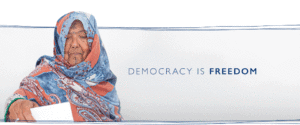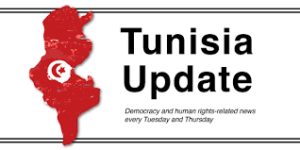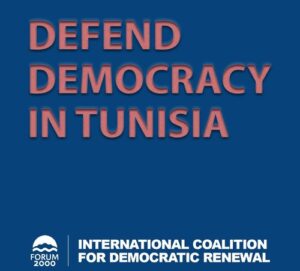Without the amplifying force of smaller parties & powerful civil society groups, esp @UGTT_TN, Citizens Against the Coup’s roadmap to restore Tunisia’s constitutional order will be a dead letter, @MonicaLMarks writes for @DAWNmenaorg https://t.co/Z2JPNy6umv
— Democracy Digest (@demdigest) February 2, 2022
Tunisia’s president cemented his grip over the judiciary on Sunday with a decree that lets him dismiss judges or block their promotion, helping consolidate his power after he seized executive authority last summer in a move his foes call a coup. President Kais Saied outraged his opponents and alarmed democratic foreign allies with his announcement last week that he was dissolving the Supreme Judicial Council, a body that guaranteed judicial independence, Reuters reports.
 Said Benarbia, the regional director of the International Commission of Jurists, told AFP news agency that the decree “enshrines the subordination of the judiciary to the executive”.
Said Benarbia, the regional director of the International Commission of Jurists, told AFP news agency that the decree “enshrines the subordination of the judiciary to the executive”.
“If implemented, it would effectively end judicial independence and the separation of powers in Tunisia, and with it, the democratic experiment in the country,” Bernabia said.
In launching an attack on the judiciary, Saied is once again targeting an institution that many Tunisians have grown to distrust—in large part due to his frequent criticism, Stanford University’s Nate Grubman writes for The Journal of Democracy.
Kais Saied’s plans to dissolve the court is a deliberate and dangerous step toward strengthening his stranglehold on Tunisia’s freedoms. Read @NateGrubman “A Dictator’s Day in Court.” https://t.co/pjVWgOtrYq
— Journal of Democracy (@JoDemocracy) February 11, 2022
As Saied has brought back one-man rule and otherwise severely eroded democratic norms, the international community has largely been silent, said Amy Hawthorne, deputy director for research at the Project on Middle East Democracy (POMED). All this could open the door for a more experienced and ruthless autocrat to replace Saied and successfully resurrect the police state.
Tunisian democrats have, since July 25, been trapped in a hostage situation, characterized by a combination of literal and metaphorical and voluntary and involuntary house arrests, reinforced by successive COVID lockdowns, writes Monica Marks, Assistant Professor of Middle East Politics at New York University, Abu Dhabi:

Credit: POMED
Polling indicates that Saied’s support with the general public nearly halved since late July. In the same poll, the percentage of Tunisians who believe what happened on July 25 was a coup has risen from roughly 40 percent to 65 percent. This shift is important in part because the question of whether Saied had undertaken a coup was the focus of intense debate among Tunisians and human rights and democracy advocates last summer.
Saied has said he will uphold rights and freedoms won in the 2011 revolution that brought democracy and that he will put a new constitution to a referendum this summer, with new parliamentary elections to follow in December, Reuters adds. However, with Tunisia facing a rapidly looming crisis in public finances, the Western donors that have previously bailed it out have voiced deep concern at Saied’s moves and have said any political process needs to be inclusive.
“What has happened is the completion of the coup… Tunisia has become a nascent dictatorship after being a nascent democracy,” Nadia Salem, one of the protesters, said.
Citizens Against the Coup is explicitly endeavoring to transcend the history of ideological suspicions that have helped Tunisia’s dictators divide and rule for decades. To derail Saied’s plans, Tunisians have at least two options, adds Marks:
-

ICDR Statement on the recent anti-democratic actions in Tunisia
First, parliament can be unfrozen for a limited time, as Citizens Against the Coup demands, in order to approve and organize elections constitutionally. This would require opposition groups currently located in camps two and three to move toward camp one, shelving their criticisms of Ennahda as second-order problems to be resolved after resurrecting Tunisia’s constitutional order and putting its constitution and democracy back on life support.
- A second option would require camps one and two of the opposition—Citizens Against the Coup and the “both/ands”—to switch from boycotting Saied’s derisory roadmap and move into a new fourth camp, which would back his referendum and parliamentary elections only on the explicit stipulation that such votes be conducted freely and fairly with the full participation of all legal political parties. To stand any chance of swaying Saied into abiding by this stipulation, it would need to be amplified by clear and specific messaging from Tunisia’s international partners, most importantly France and the United States.
Citizens Against the Coup has submitted an alternative, actionable roadmap that could restore Tunisia’s constitutional order, which enjoys the tacit support of the three dominant parties in the still-frozen parliament—Ennahda, Qalb Tunis and Karama, Marks asserts. But the sobering reality is that without the amplifying force of Tunisia’s smaller parties and powerful civil society organizations, most crucially UGTT, that plan will be a dead letter. RTWT
Tunisia: democracy or authoritarianism? (below). 21 FEBRUARY 2022. FROM 19:00 TO 20:30 | CONFERENCE | FRENCH | SPANISH | SALA DE ACTOS, IEMED







